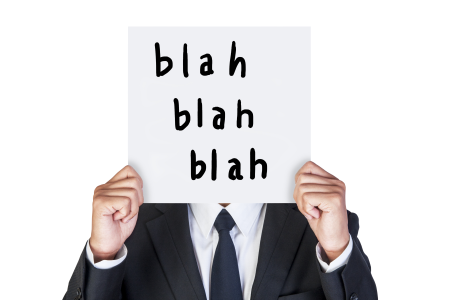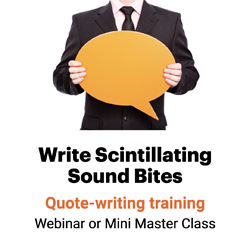Reporters hate PR quotes
What’s the least important element in a release — less important even than the dateline or the boilerplate?

Quotes, say one in four reporters surveyed in a study by Greentarget. According to Greentarget’s research:
- 13% of journalists never use quotes from releases.
- 31% rarely use quotes from releases.
- 28% use quotes from releases only when they’re on deadline and can’t get an interview.
- 28% use quotes from releases regularly.
What’s their beef?
- 50% complain that the language doesn’t sound natural.
- 34% say the quotes aren’t substantive enough.
- Only 9% have no complaints about the quotes.
“Please don’t make me wade through a bunch of boilerplate, taglines and patting-ourselves-on-the-back quotes to find out if the news release is relevant,” begs one journalist surveyed by Greentarget.
Another writes: “I dislike press releases that have ‘spin.’ I just want the facts. Not a sales pitch, not canned quotes about how fantastic the person/company/event is.”
‘Don’t sound natural’
“Most quotes in press releases sound like the teacher in Charlie Brown cartoons: ‘Wah wah wah wah.’”
— A frustrated PR pro
These aren’t unreasonable complaints, considering the wah wah that passes for quotes in releases these days.
Here are three quotes from releases posted on PRNewswire recently. (I could show only one in my PR Tactics column, because these suckers weigh in at more than 100 words each — 20% of my word count. Think about that for a minute.)



Wah wah, indeed.
Transform the wah wah.
How do you get the wah wah out of your release quotes? Make quotes:
1. Short.
While PR quotes measure in the triple digits, journalists use much shorter quotes. In fact, the average length of a quote in a recent issue of The New York Times, not including attribution, was between 19 and 20 words, according to a 2015 Wylie Communications analysis. The most common length: seven words.
So “peel the quote back to one great sentence,” counsels Jacqui Banaszynski, a chaired editing professor at the University of Missouri.
How about:
“Hot rodders, racers and other street performance enthusiasts will now be able to do something better [we can’t figure out what from the release], thanks to our merger,” Callahan says.
2. Rare.
Don’t use quotes to convey basic information, as in this release on the Hip Hop Hall of Fame:
“The program curriculums are currently being designed and prepared to launch first class this fall with all classes online in 2016,” stated Pierre Voltaire, the Educational Program Coordinator Consultant.
Instead, paraphrase.
3. Personable.
Clearly, no human ever uttered the words, “MSDP provides the ideal partner for Holley, a Lincolnshire portfolio company that is the leading manufacturer and marketer of performance fuel and exhaust systems.” Just as no human has ever sought “customizable, comprehensive literacy solutions.”
Write quotes that sound human, not like a computer spit them out. Here’s one to model, from a Pulitzer Prize-winning series in the New York Daily News about the declining health of 9/11 rescue workers:
“I’m begging for someone to help me,” Valenti said. “I do not want to die.”
4. Creative.
Quotes should sound like more than just the most basic parts of human speech. Make your executive seem eloquent — even interesting. Here’s a New York Times quote by former New York mayor Ed Koch on political consultant David Garth:
“I said, ‘Listen David,’” Mr. Koch recalled, “‘You want me to kill my mother? Tell me what time and where?’”
Now, that’s a quote that reporters won’t shoot down.

Leave a Reply